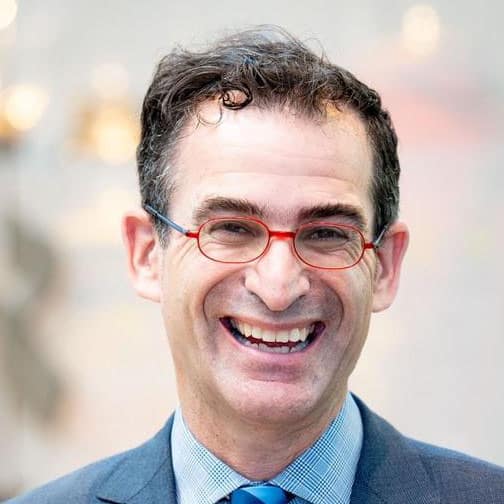 Photo by Sol Vázquez Cantero / EyeEm/Getty Images
Photo by Sol Vázquez Cantero / EyeEm/Getty Images When I was 16, I worked for an architect on Nantucket Island. It was an idyllic summer. I rode my bike 10 miles each way. I ate delicious foods from local farms and bakeries. Each Friday I led services at the local shul.
One evening, I went to the pizza place to get a well-deserved dinner. As I walked out, an older teen approached me and said, “Hey, you’re the guy who stole my bike.” He then knocked the pizza off my plate. I still remember it hitting the ground. He continued, “You’re Jewish, are you?”
I froze. It’s amazing. Thirty-five years later, and I still remember the feeling up my spine. I lied. I was truly terrified. He then said, “Wait, you’re not the guy.” I hopped on my bike and rode off, relieved. But I was also ashamed. I had never before lied about being Jewish. I had never worn that mask. On the one hand, this mask hid me. On the other hand, it protected me.
We are living in a time when masks are part of everyday conversation. At times, the laws regarding them seem necessary. And at times, they seem arbitrary. But the metaphorical masks we wear are far more significant and penetrating than the physical masks of this awful pandemic. Yom Kippur is a time to think deeply about the everyday masks we wear, because Yom Kippur is a reminder that we all have things that we hide from the rest of the world.
Yes, we all wear masks. And yes, those masks can protect us. But they also can become barriers to the light that is within.
Here are four biblical examples of masks:
The mask of Joseph
One of the 12 sons of Jacob, Joseph hid his identity from his brothers because of years of anguished childhood memories. Joseph was the favored son of Jacob, whose brothers sold him into slavery — expecting never to see him again. But Joseph emerges as the prime minister of Egypt. Because of famine in Canaan, his brothers come to Egypt for food. They don’t recognize that the prime minister is Joseph. Indeed, Joseph conceals himself, perhaps out of vengeance, perhaps out of spite. But the turning point happens when Joseph removes the mask and says, “I am Joseph, your brother.” It is one of the most authentic moments in the Torah.
There are times we wear the mask of Joseph: masks that separate us, elevate us, and make us feel better about ourselves. And there are times we are able to take off the masks.
The mask of Moses
When Moses comes down from Mount Sinai carrying the tablets, our text teaches, “the skin on his face sent forth beams” (Exodus 34:30).
The people are afraid to approach him. As a precautionary measure, Moses places a veil — a mask — on his face so that the people will not be overwhelmed. What does this mean? Moses’ job was not an easy one. The people often complained, and they even rebelled at times. Moses’ shining face revealed too much light at any given time, and the people were not able to absorb it all at once. And so, he had to wear a protective mask as part of his uniform, because others just were not able to understand him.
The mask of Esther
In our Purim story, Esther must conceal her Judaism in the face of Haman. How many Jews throughout history have been in hiding? How many Jews during the Crusades and the Inquisition? How many Jews during the pogroms and the Holocaust? How many “Rabbi Zachs” when confronted by a bully?
Esther, whose very name means secret, had to wait for the right opportunity to reveal her identity. She created the opportunity — to stand up, to remove her mask and to use her voice to effect change.
The mask of God
What is the mask that God wears? There’s a section in the Torah that I often struggle with. God says to Moses: “I will make all My goodness pass before you …. But you cannot see My face, for a person may not see Me and live.” God said [further]: “Here is a place with Me. Station yourself on the rock and, as My Presence passes by, I will put you in a cleft of the rock and shield you with My hand until I have passed by. Then I will take My hand away and you will see My back; but My face will not be seen.”
I’ve tried time and again to come to terms with this text. Why must there be a barrier, a mask between humanity and God? Shouldn’t we be able to absorb God’s divine light without a filter, without a mask?
Chassidic Master Rabbi Nachman of Breslov taught that “The end of knowledge is that we do not know.” He means that our search for God must begin with an element of doubt. If we could see God right away, our spiritual quest would be empty. And so, there is a mask. And we spend our lives trying to understand.
Why must there be a barrier, a mask between humanity and God? Shouldn’t we be able to absorb God’s divine light without a filter, without a mask?
Perhaps, just like with this mask of God, there is opportunity for us today, behind our masks, to look more deeply into someone’s eyes, to listen more intently to their voice, to discover more completely their emotions, to see them soul-to-soul in a way we might otherwise take for granted.
For the first 26 years of my life, I wore a mask, pretending to be straight. I tried.
The women I dated were more like buddies. My senior year in college, I dated Lucy. But I realized a few months in that I was miserable in the fraud, so I broke up with her. It wasn’t an honest break up. A few weeks later, Lucy and I had a heart-to-heart.
I was on the verge of coming out to her but I didn’t. In the depth of the conversation, Lucy looked at me and said, “Zach, when you take your mask off, and you are being honest, you are beautiful in a way I’ve never seen you.”
Yes, we all wear masks. And yes, those masks can protect us. But they also can become barriers to the light that is within. But remember, we are all in the image of God. God’s handprint has the opportunity to touch everything we touch, and God’s smile has the ability to shine upon each face we encounter. If we hide behind a mask, we deny ourselves — and the world — an experience with divine goodness.
While we might need to wear the mask to protect us from the elements, on this Yom Kippur, we take off the masks that prevent us from being our true selves — that eclipse our loves, our passions, our truths from blossoming. We take off the masks that hide our essences, that compromise our dreams and that deny our wisdom. Joseph, Moses, Esther — they all removed their masks. And God, we ask today that You remove Your mask, just for this moment in time, that we may connect more closely.
Dear God, on this Yom Kippur, we want so very deeply to connect. May our souls be open to receiving Your light, and may our faces then shine with beauty, truth and radiance.
Rabbi Zach Shapiro is the Spiritual Leader of Temple Akiba, a Reform Jewish Congregation in Culver City.






















 More news and opinions than at a Shabbat dinner, right in your inbox.
More news and opinions than at a Shabbat dinner, right in your inbox.